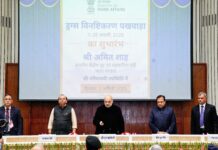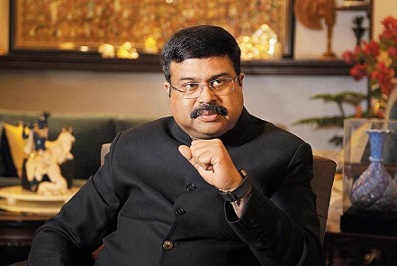By Our Correspondent
NEW DELHI/BHUBANESWAR: Union Minister of Petroleum, Natural Gas and Steel Dharmendra Pradhan in the Lok Sabha in a written reply on Monday said that the Ministry of Petroleum and Natural Gas is working in collaboration with various Central Government Ministries/stakeholders to make efforts to achieve reduction in import dependency on oil.
The import reduction strategy broadly includes increasing domestic production of oil and gas, improving energy efficiency and productivity, giving thrust on demand substitution, promoting biofuels and alternate fuels and renewables. The Roadmap has highlighted various strategies/initiatives which can be taken for reducing import dependency, for which disaggregated level targets have not been indicated.
As per the schedule stipulated in Hydrocarbon Exploration and Licensing Policy (HELP)/Open Acreage Licensing Policy (OALP), four bidding rounds have so far been finalized in which 94 exploration blocks have been awarded covering an area of approximately 1,36,790 sq. km. OALP Bid Round-V offering 11 blocks covering an area of approximately 19,800 sq. km. was also launched on 14th January, 2020.
The Government, through Oil Marketing Companies (OMCs), is implementing Ethanol Blended Petrol (EBP) Programme and Biodiesel blending programme for blending of ethanol and biodiesel with Petrol and High Speed Diesel respectively.
Further, in order to improve the availability of ethanol for blending with petrol and thereby reduce imports of petroleum products, the Government has opened the Second Generation (2G) route and allowed use of other feedstocks like grains, sugarcane juice, fruit and vegetable wastes etc. for production of ethanol.
Government is also promoting production of Compressed Bio Gas from various wastes / biomass sources. In this direction, Oil PSUs have launched ‘Sustainable Alternative Towards Affordable Transportation (SATAT) initiative. Government has also notified the National Policy on Biofuels – 2018 which envisages an indicative target of 20% blending of ethanol in petrol and 5% blending of biodiesel in diesel by 2030.
The Government in February, 2019 approved major reforms in exploration and licensing policy to enhance exploration activities, attract domestic and foreign investment in unexplored/unallocated areas of sedimentary basins and accelerate domestic production of oil and gas from existing fields. The policy reforms inter-alia aims to boost exploration activities with greater weightage to work programme, simplified fiscal and contractual terms, bidding of exploration blocks under Category II and III sedimentary basins without any production or revenue sharing to Government, early monetization of discoveries by extending fiscal incentives, incentivizing gas production including marketing and pricing freedom, induction of latest technology and capital, more functional freedom to National Oil Companies for collaboration and private sector participation for production enhancement methods in nomination fields, streamlining approval processes and promoting ease of doing business including electronic single window mechanism.
Pradhan said the consumption of petroleum products in the year 2018-19 was 213.2 MMT. The percentage of Import Dependency on Oil based on consumption of petroleum products during the 2018-19 was about 83.8%.
Indian Strategic Petroleum Reserve Limited (ISPRL), a Government of India Special Purpose Vehicle, has established Strategic Petroleum Reserves (SPR) facilities with total capacity of 5.33 Million Metric Tonnes (MMT) at 3 locations, namely (i) Vishakhapatnam, (ii) Mangaluru and (iii) Padur. As per the consumption pattern of 2017-18, the total capacity is estimated to provide for about 9.5 days of crude oil requirement. Oil Marketing Companies (OMCs) currently have stock for 64.5 days. Hence, total capacity storage of petroleum products is 74 days.
Government has given ‘in principle’ approval for establishing two additional SPR facilities with total storage capacity of 6.5 MMT at two locations namely (i) Chandikhol in Odisha (4 MMT) and (ii) Padur in Karnataka (2.5 MMT).
As per the consumption pattern of 2017-18, 6.5 MMT SPR capacity is estimated to provide for about additional 11.57 days of India’s crude oil requirement. Government has also given ‘in principle’ approval for exploring public private partnership model for Phase II. The petroleum products are sold by the Oil Marketing Companies (OMCs). Any profit / loss on sale of petroleum products accrues to the OMCs and not to the Government.
Petroleum & Natural Gas Regulatory Board (PNGRB) is the authority to grant authorization to the entities for development of City Gas Distribution (CGD) network in Geographical Areas (GAs) as per PNGRB Act, 2006. Establishment of Compressed Natural Gas (CNG) Stations is a part of development of CGD Network and the same is carried out by the entities authorized by PNGRB based on techno-commercial viability.
So far, PNGRB has authorized 230 Geographical Areas (GAs) for development of CGD Network across the country which covers around 71% of India’s population and 53% of its area. Remaining areas of the country will be covered for development of CGD network in future bidding rounds subject to techno-commercial viability, natural gas pipelines connectivity and natural gas availability. PNGRB has also informed that no CNG stations are operational in the state of Tamil Nadu. As on 01.02.2020, 1989 CNG stations are operational in the country including Assam, Delhi NCR and Chandigarh.






















